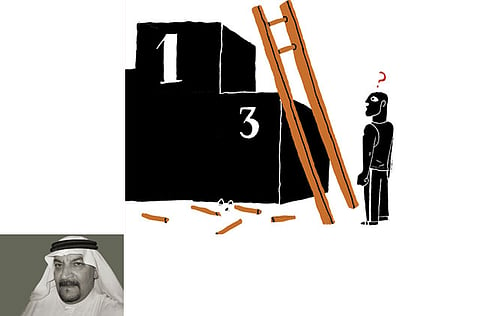Arab world’s quest for Olympic gold
A negative attitude towards sports and physical activity is a problem

The 2012 London Olympics are over. Over 10,000 athletes from 204 countries participated in the event that takes place every four years. 17 Arab countries sent their athletes to London, athletes who managed to win 12 medals between themselves; but only two were gold.
Believing that the gold medals were inadequate for an Arab world with a population of 350 million, I asked some friends why we fare so poorly in international sporting meets. If Iran, Kazakhstan and Cuba individually equalled or bettered the feat of 17 Arab nations, is the Arab world on the right track?
Sameera from Riyadh says: “Islamic history shows us that Muslims in general were lean and healthy as physical activity, apart from being a part of life, was encouraged by religious scholars. Unfortunately, today physical activity and sports hardly play a role in our lives. They are also discouraged by clerics, especially with regards to women. On what basis I fail to understand.’
Barbara, a former resident of Jeddah, adds: “I believe it has to do with the general emphasis on relaxation, or in simple terms — laziness. There seems to be a lot of value placed on doing nothing, with bits of good conversation sprinkled in. Competition is left to the few good football players and their ever-faithful fans. The rest pride themselves in living a life of leisure and watching TV. The few brave women who are willing to step out are the subject of ridicule by judgmental idiots with little to do.”
Heidi from Jeddah says: “Potential athletes in the Arab world, especially females, find little encouragement in becoming active or involved in sports. Most families at best encourage their sons to play football. The parents themselves are often not involved in any kind of sports or exercise programmes. Thus role models showing interest in physical activity as a lifestyle are lacking. Most schools in the Arab world generally show the same lack of interest, except for football. Sportsis not considered important for girls. Generally speaking, it is in schools that promising athletes are spotted, encouraged, trained and groomed for competitions. Funds are lacking for infrastructure and equipment for physical education classes.”
Saada from Dubai says: “In order to win medals you need to do few things: Identify achievement as an important component of your life and plan on how to get there; work hard or be ready to work hard; focus, focus, focus! Arabs don’t do any of the above. You could argue that the general culture is not in support of personal achievement and that governments in the Arab world do not care or value such international events, but these are secondary in my view.”
Ali from the US interjects: “I would attribute this travesty to early crushing of people’s dreams, aspirations and self-initiative. In other words, children are not encouraged to explore ... if they transcend the borders of what someone decides for them: fathers, religious men and personalised institutions that control their lives from cradles to graves. Poverty, miserable climate and multitude of taboos kill incentives. Above all is the total lack of freedom of choices and expressions.”
The blogger, American Bedu, adds: “I think the Arab world is short of medals because the concept of physical education has been sadly lacking in society. For women it is virtually non-existent and for men it is a choice. The overall culture leans towards a sedentary lifestyle where diabetes, cancer and other diseases are common. To change this trend, the importance and enforcement of physical education needs to be actively addressed at the primary level in schools.”
Accountability
Mubarak comments: “Where do you think the state allocated money goes? To public schools for sports facilities? To develop athletes? No! It is for free junkets for sports officials and their families. Where is the accountability? Cuba has more medals than the entire Arab World. What a shame.”
Ben notes: “Is the Arab world short only in the international sporting events? It is at all level unfortunately! We do not lack athletes; we do lack the central spirit that is locked on spiritual matters to the point of turning back against the clerics themselves. As long the people in charge have never experienced sporting evens from early days of school nor felt a real official drive toward it we lose those capable and gifted in the back streets.”
Ebrahim adds: “It is worth noting that the sports authorities in some of Arab countries are indeed bloated with funds. A regional economist once remarked that the annual budget for some of these sports ministries exceeds the entire annual operating budget of some countries in the developing world, and so lack of funds is not an excuse. Nepotism too plays its part in the appointment of unqualified sports ministers.”
These views capture some of the diverse feedback that I received on the Arab world’s achievements in the sporting arena. We can either relegate the meagre performance at the Olympics to history, or be bold enough to change the way things are done in the quest for gold.
Tariq A. Al Maeena is a Saudi socio-political commentator. He lives in Jeddah, Saudi Arabia.
Sign up for the Daily Briefing
Get the latest news and updates straight to your inbox


